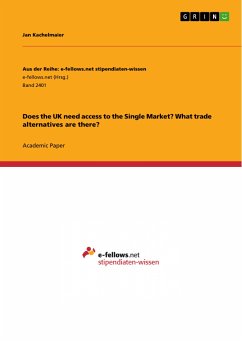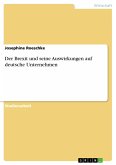Studienarbeit aus dem Jahr 2019 im Fachbereich VWL - Internationale Wirtschaftsbeziehungen, Note: 2,0, FOM Hochschule für Oekonomie & Management gemeinnützige GmbH, München früher Fachhochschule, Sprache: Deutsch, Abstract: The decision on the Brexit has triggered an unprecedented process in European integration: differentiated disintegration, the selective reduction of the level and scope of integration of a member state. The extent to which European integration is influenced by this phenomenon is discussed in more detail in this paper. Also, the effect of a free trade agreement similar to the CETA, as a solution for Brexit and to counter political separatism. In addition to free trade and the abolition of customs duties, this solution also has negative consequences, provided that no concessions are made to the UK, especially in the area of services. These would have to be taken in order to respect the different economic structure of the UK compared to Canada. The traditional CETA would therefore have to be modified for the UK, which makes a CETA+ quite conceivable. Whether and to what extent Brussels will make concessions to the UK will have to be observed in the future. Already in January 2013 the British Prime Minister David Cameron has promised to renegotiate the European integration of the United Kingdom in a referendum. On 23 June 2016 it was followed by what many, not even the Brexit supporters, had seriously reckoned: In a referendum, 51.9% of the members voted in favour of leaving the EU. This triggered an unprecedented process in the history of European integration - differentiated disintegration. The day after the election, Europe was in turmoil, as can be seen from the following statements: Donald Tusk, President of the European Council, spoke of a "historic moment, but certainly not the time for hysterical reactions". Federal Chancellor Angela Merkel explained the result not only as a "cut for Europe", but also as a "cut for the European unification process".
Dieser Download kann aus rechtlichen Gründen nur mit Rechnungsadresse in A, B, BG, CY, CZ, D, DK, EW, E, FIN, F, GR, HR, H, IRL, I, LT, L, LR, M, NL, PL, P, R, S, SLO, SK ausgeliefert werden.









